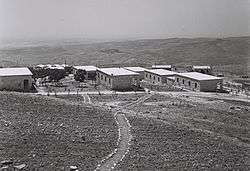Masu'ot Yitzhak
| Masu'ot Yitzhak מְשּׂוּאוֹת יִצְחָק | |
|---|---|
| Hebrew transcription(s) | |
| • standard | Mesu'ot Yitzhak |
 | |
 Masu'ot Yitzhak | |
| Coordinates: 31°42′11.87″N 34°41′22.2″E / 31.7032972°N 34.689500°ECoordinates: 31°42′11.87″N 34°41′22.2″E / 31.7032972°N 34.689500°E | |
| District | Southern |
| Council | Shafir |
| Affiliation | Hapoel HaMizrachi |
| Founded |
1945 (in Gush Etzion) 1949 (current location) |
| Founded by | Central European immigrants |
| Population (2015) | 705[1] |
| Website | www.massuot.co.il |
Masu'ot Yitzhak (Hebrew: מְשּׂוּאוֹת יִצְחָק, lit. Yitzhak's Beacons) is a moshav shitufi in southern Israel. Located near Ashkelon, it falls under the jurisdiction of Shafir Regional Council. The original kibbutz in Gush Etzion was destroyed and depopulated in the 1948 Arab–Israeli War,[2] and a new settlement was established in 1949 in a different location. In 2015 it had a population of 705.
History

Kibbutz Masu'ot Yitzhak was founded in 1945 in Gush Etzion, midway between Jerusalem and Hebron. The settlers were young pioneers from Hungary, Czechoslovakia, and Germany who arrived before World War II. The kibbutz was named for the chief rabbi of Palestine, Yitzhak HaLevi Herzog.[3]
The settlers of Masu'ot Yitzhak rose to the challenge of living in the Judean Mountains, building homes and planting orchards. In 1948, Gush Etzion was captured by the Arab Legion. The residents of Kfar Etzion were massacred, and all other inhabitants of Gush Etzion, including the residents of Masu'ot Yitzhak, were captured and imprisoned in Jordan.[4]
After their return from captivity in 1949, the Masu'ot Yitzhak pioneers established a new moshav of the same name near Shafir, a region inhabited by the Philistines in biblical times. The prophet Micah spoke about Shafir (Micah 1:11). Shafir had served as a base for the southern front of the Israeli army during the 1948 war. According to Walid Khalidi, it was established on the lands of the Arab village of al-Sawafir al-Gharbiyya.[5]
Tzahali, a military preparatory program for religious girls, is based in Masu'ot Yitzhak.[6]
Economy
The moshav economy is based on agriculture and industry. A reservoir was built 40 years ago to harness the winter flood waters of Nahal Lachish for farming. The water is used to irrigate 125 acres (0.51 km2) of avocado trees. [7]
References
- ↑ "List of localities, in Alphabetical order" (PDF). Israel Central Bureau of Statistics. Retrieved 16 October 2016.
- ↑ The Streets of Jerusalem: Who, What, Why, Ronald L. Eisenberg
- ↑ Masu'ot Yitzhak Homee.co.il (Hebrew)
- ↑ The Streets of Jerusalem: Who, What, Why, Ronald L. Eisenberg
- ↑ Khalidi, Walid (1992), All That Remains: The Palestinian Villages Occupied and Depopulated by Israel in 1948, Washington D.C.: Institute for Palestine Studies, p. 133, ISBN 0-88728-224-5
- ↑ Shooting Israel: Seeing Jerusalem through the lens of a camera Haaretz
- ↑ Mas'uot Yitzhak reservoir Jewish National Fund
Further reading
- Between Jerusalem and Hebron: Jewish Settlement in the Pre-State Period, Yossi Katz
External links
- Village website (Hebrew)
- Memorial for Masu'ot Yitzhak in Gush Etzion Etzion Bloc (Hebrew)
- Orit Segal (2006): Massu’ot Yizhaq Final Report, Hadashot Arkheologiyot – Excavations and Surveys in Israel, No. 118.